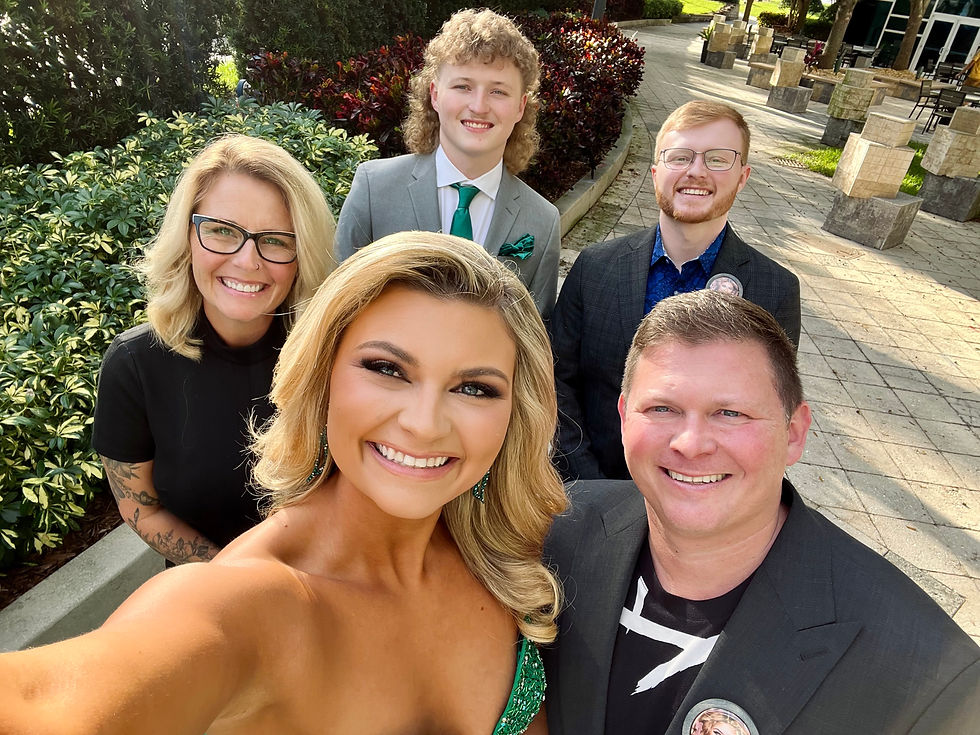- Hannah Slater

- Nov 8, 2024
- 7 min read
Hey, Y'all, It's Hannah Slater here, your host of Girl Chat. Welcome to another Girl Chat Blog. Today, we are going to be talking about food insecurity, what it's like to ask for help, what it's like to be on food stamps, and what it feels like to go through that experience. We will also discuss what it is like to overcome food insecurity and be able to give back to our communities.
My mom is a very special guest for this blog/episode! She will share her experiences, including what it was like for our family to be on food stamps and overcome food insecurity. My mom is also the founder of Stepping For Hunger, a non-profit organization that has really launched our mission of fighting food insecurity.
Before we get into this conversation, I just want to say that this is an extremely sensitive topic that is not talked about a lot. There are serval people fighting food insecurity that you might not even know they are struggling; it's not necessarily always so visible. I am SO extremely grateful that my mom is being so vulnerable, willing, and open about her/our family's battle with food insecurity.
Mom, I appreciate you joining this episode of Girl Chat, being vulnerable, and sharing your story of Stepping For Hunger and asking for help all those years ago.
What made you want to start Stepping For Hunger in 2008?
My mom, "Thank you, Hannah, for having me join today. This is a tough topic to talk about because it does show vulnerability in an area that people don't like to talk about. In 1997, we were a couple of kids college kids living in Madison, WI. Brian was a UW athlete on a full scholarship, but because we chose to live off campus, we didn't get to capture a lot of those privileges. Then, I got a job; Brian got a part-time job to try and help out in between juggling school and trying to support a family. We Welcomed a beautiful baby boy in our family, and things just started to spiral out of control. Even before he was born, I went into preterm labor, and I had to be off work for a couple of months. Then, when Bailey came into the house, it was still hard to make ends meet. No matter what we tried to do, we couldn't pay the bills, put healthy food on the table, and be financially set. At the same time, Brian was struggling with how to get out of his athletic career, which was really hard at that time, too. He ended up stepping away and taking a full-time job, a more financially stable job, but it still wasn't enough. So we decided to, month after month of trying to figure out what we had to give up in order to feed ourselves; it just got to the point that there was no more help, and we couldn't do anything else. Back then, you couldn't just get on your phone and do some Google searches to find your closest rescue center, so we had to make phone calls and go visit people. It was humiliating, and we ended up at a shelter whose primary focus was young women because we were not married at that time. Which was a great benefit because I was eligible for it, even though they didn't really even welcome Brian into the room at all, which was really devastating because we were still a family, and he was trying to help. But the second we sat down and had this 3-hour conversation, we just felt that we weren't good enough, that we shouldn't have had a child, that we were incapable of being humans, being adults, and that really left a hard taste on our mouths, when you are asking for help. You get that resistance or that judgment from people who are specialized in these fields to help people. I did qualify for WIC, which is for Women, Infants, and Children. I did qualify for that, and it did help. It was a supplement, but every time you took that card and went to buy your cheese and milk and the necessities you need every month, we were judged every single time, over and over. More importantly, it actually opened up that wound from actually applying for WIC. We never got away from it. "
"Once we were able to get financially stable, Brian and I both made a pact that we would never be in that position; we would do everything in our power to never be in that situation again. So that taught us how to live within our means and budget. As I got older and we had more children, we moved out of Madison and back to our hometown; I started to be aware of how many people were actually struggling and trying to put not only food but healthy food on their table. So when Brian and I got to the position where we could help, which was in 2008, at that time, we weren't business owners; we were just parents, but we decided to make a difference because we were able to pay out bills and put food on our tables. That's all we needed; at that point, our children were taken care of. We decided to put on this little 5K back in 2008, which, back then, no one was doing, and we had great success. We raised $10,000, I think, our first year, if I remember correctly, or $8,500 somewhere in there. To be able to give that kind of money back to a small organization so they could buy food for people in the community was very rewarding. So it just kind of spiraled off of a personal moment that I don't think anyone should feel ashamed about if they are going to ask for help. I wanted to make that change for people when they come to our food pantries. We are giving food out; we never ask those income guidelines, and we never ask or judge if they are not married or just the situation they are in because, at the end of the day, food insecurity can hit at any time; any person, in the biggest home or the little home, because if all it takes is one tragedy to change the whole trajectory of your life. It could be even momentarily; ours was only momentarily, we only needed it for a little amount of time, but that also gave me the legacy to put my feet on, to try and do better."
Our home base, where we grew up, is the second poorest county in Wisconsin, so food insecurity is very prevalent there. I want to discuss the stats of Stepping For Hunger and the difference it has made in our communities since 2008.
My mom: " Back in 2008, we were just getting going; the whole platform was based on us running and trying to blossom a community for better health. Brian and I were running along with my brother, Travis, so that is where it bridged off. We had a great, successful first year, and that just grew into 10Ks, half marathons, bike races, and mud runs. We dove into these events because sometimes it's hard to ask a business to donate where it's not really involving the community. We wanted to do activities not only to raise money but also for the camaraderie of our communities so we could talk about food insecurity. It's more than just handing off a check to help fight hunger; we are talking about it, making people feel valued, and having the community help raise money by doing all of these events. As the years went on, it grew and grew. We brought concerts into our community. Of course, this was after Brian and I were business owners with Mill Haven Foods, so we had a really nice sponsor that Brian and I were driving, which allowed us to grow this platform larger than I could have imagined. Micheal Ray came into our community one year, which was amazing; we raised, I think, $18,000 to give back to the community. Throughout the years, I volunteered my personal time at the local food pantry and wanted to do more. Government standards regulate many food pantries, and they have to ask these questions to get funding; because of our foundation and our sponsor, we were able to lift those guidelines. In my opinion, it shouldn't be a requirement about how much money you make or how much money you don't make. If you are coming to ask for help with food, I want to be able to help you put food on your table. That was the foundation of what started our inner company food pantry. We would host mobile food pantries and service up to 250 families in one day. People would come in their cars, and we would help them shop for anything from potatoes to hamburger meat to whatever we could get our hands on for our pantry. More importantly, we got to know everyone's names and shopped with them; our employees got to help, my children got to help, and it was very rewarding to see that blossom. We kind of expanded outside of Wisconsin. That was mainly Hannah focusing on that. She wanted to really help some of the hurricane devastations in Texas, so she coordinated to send 42,000 pounds of food, which is a full semi, down to Texas. She flew down there and distributed the food, talked to the people, and got the supplies that we were able to send down there. That's just one state; we are in Georgia, Hannah. Where are you going now?"
We are actually fighting food insecurity in 9 states.
Wisconsin
Nevada
Iowa
Minnesota
Illinois
Texas
Michigan
Georgia
North Carolina
We currently have 200 holiday boxes going to Georgia and 200 going to North Carolina. Ultimately, the goal is to fight food insecurity in all 50 states.
As we head into this holiday season, I encourage you to reflect on where you are, how you got there, and how you can give back. The smallest things can make the most significant difference. With respect, empathy, and action from every person listening or reading, we can create a different future, and that future looks like one for food security for everyone. I genuinely believe we can get there if we all pitch in when we can, and again, the smallest things make a big difference, so whether you are cleaning out your pantry and you have items that you don't use anymore or don't like, instead of throwing those items away, donate them to your local food pantry because a family in need could use those.
Thank you so much for tuning in and reading this Girl Chat blog! I am so grateful that you are on this journey with me.
XOXO,
Hannah Slater
























